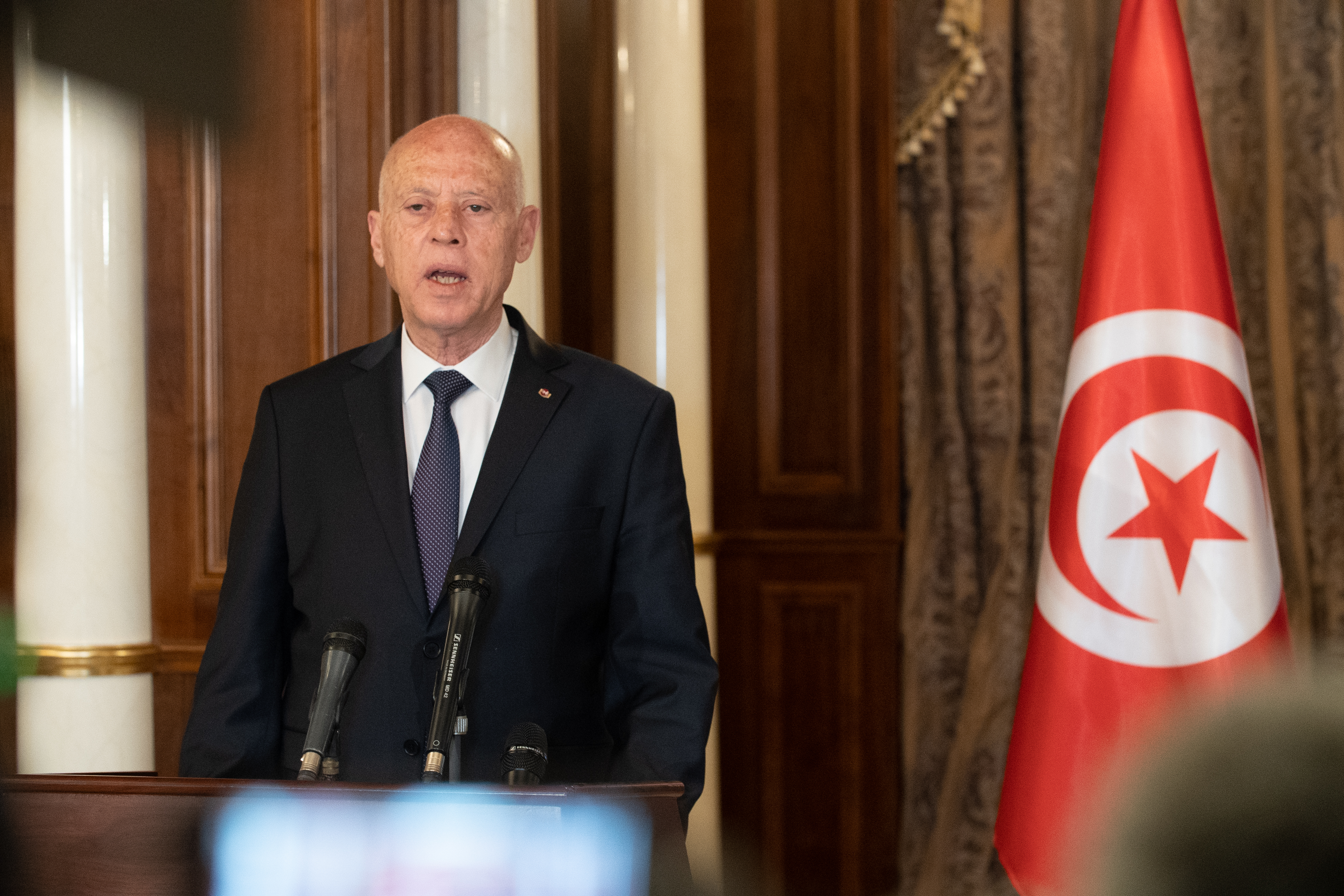MENAPOL Blog
Tunisia at the Crossroads - Why Tunisia’s power shift should be a cause for concern

Tunisian president Kais Saied has assumed sole power in the country and now represents the executive, the legislative and the judiciary unified in one person. Tunisians are celebrating his power grab. Observers in the region and in Europe are awaiting his next steps. The country is at a dangerous pathway.
On Sunday 25 July 2021, Tunisian president Kais Saied announced he would assume the executive power in the country, dismissed the government of Prime Minster Hichem Mechichi and suspended the parliament for 30 days. Additionally, he suspended the legal immunity of parliament members, took control of the general prosecutor's office, fired the defense minister as well as the acting justice minister, announced the removal of the army’s chief prosecutor, advisers to the former prime minister and other senior government officials. He also lengthened the existing curfew and banned public gatherings of more than three people, asking the army to manage the country’s pandemic response from now on.
President Saied justifies these moves as immediate and necessary response towards public anger over the country’s dire economic situation as well as the government’s inability to handle one of the worst Covid-19 outbreaks on the African continent: The death toll from the virus has topped 18.000 and about 200 people out of a population of 12 million are dying each day from the disease. While he refers to Article 80 of the Tunisian constitution, experts’ opinions on his interpretation of this article differ and are regarded as highly controversial. According to the International Crisis Group, his close circles had spoken about his desire to invoke Article 80 of the constitution months ago already. While the originally set time period of 30 days for the suspension of parliament has already been extended by now, still no next steps for how to move forward have been announced. This strains the already fragile grounds of this power shift even further.
While his opponents in parliament accused him of having staged a coup, large numbers of Tunisians took to the streets immediately in celebration of the events, with people dancing, singing the national anthem and shouting: “Long live the president!” According to a poll released by North African research firm Emrhod Consulting, a staggering 87% of Tunisians support the president's recent actions, while only 3% oppose.
So, dear exited Tunisia analysts – what has become of “the beacon of hope”, “the one true Arab democracy”, “the only success story emerging from the Arab Spring” and the praised National Dialogue Quartet, the winner of the Nobel Peace Prize in 2015? Ten governments in ten years have so far failed to tackle corruption or revitalize the country’s economy in a sustainable way. In addition to the alarming recent steps of this power shift towards president Saied, his office has apparently fired the head of the country’s official television station and armed police raided the Al Jazeera office in Tunis confiscating equipment early August. Saied now has direct control over the Interior Ministry and Communications and Technology Ministry, replacing the ministers in charge of both. According to Reuters News Agency, several politicians and officials have been detained or put under investigation, including a senior official of the moderate Islamist Ennahda party. In the worst case, this would be a textbook example of how you gag the opposition – not uncommon in this region of the world.
Although Ennahda members and especially co-founder and leader Rached Ghannouchi most probably acted more for pragmatic reasons than out of deep democratic conviction, it needs to be underlined that they clearly ordered their supporters to refrain from violence and to counter the president’s actions by peaceful means. According to Alexander Rieper, FNF Project Director in Tunis, a mobilization of his supporters would have the potential to lead to a civil war. Ennahda is “the only party that can currently bring broad masses to the streets”. It was also Ghannouchi who suggested to hold another National Dialogue with all involved stakeholders to tackle the various crises the country is in. All motivation and underlying reasons aside, Ennahda carefully tried to portray themselves as the better democratic actor in this scenario so far. On the long run, this will put them and their supporters in the more comfortable and legitimate position and this is a wise move. Having established an eye-level connection to citizens and having offered solutions on a grass-root level was what made the party popular among Tunisians in the first place – a common feature among Muslim Brotherhood associated parties all over the region. Everything will depend on President Saied’s next steps: The vicious circle of a strongman grabbing power, popular protests removing him from office, elections taking place and a party associated with the Muslim Brotherhood winning these, only to be crushed by another strongman and the army – all this seems familiar and reminds just a little too much of Egypt. Hopefully this is not where President Saied will turn for inspiration.
What he should do, is take Ghannouchi up on his offer to reanimate a National Dialogue and return to the path of parliamentary democracy and the constitution – even though this may be a long and painful road to take and will not bring quick and simple solutions. But there certainly are other ways to hold a government accountable or to strengthen transparency within state institutions. He needs to act very quickly though, consult with the country’s main political, social and economic groups and present his plan for the next weeks to the public. Saudi Arabia and the UAE are already eying heavily on Tunisia’s unstable social situation as a breeding ground for their agendas and have congratulated Saied for his “blow to political Islam”. On a regional level, his actions against Ennahda are portrayed by many as an affront against Turkey, Qatar and Libya, whose governments are considered close to the Brotherhood.
Europe should indeed offer a helping hand – but not without very clear conditions. It cannot be a bystander. The fragile fruits of the democratic process of the last years are too valuable. Political stability is needed – but not for any price. If we do not start learning from past mistakes, we have no excuse for being surprised at the Tunisian public not trusting the model of democracy on the long run. Possible ways to move forward for Europe could include pressuring the president for more governmental transparency in order not to lose the people’s trust, facilitating a National Dialogue or offer support for developing a road map towards economic stability while demanding public commitment from government officials to this. Behind the scenes, Track II diplomacy consultations should commence immediately with influential stakeholders and it should be made clear that crackdowns against the opposition will certainly be condemned heavily.
Maybe now is the time for all too hopeful Western media and analysts to finally reflect the situation on the ground pragmatically, to stop interpreting their hopes for a democratic Middle East into every first promising step of each young democracy in the region. No one who has been following the developments in Tunisia since 2011 closely was taken by surprise by recent events. We as Europeans – and especially us Germans – should know better. We should have been the first ones to point out that democracy needs time to grow, to be understood and lived not only by state institutions and political parties, but especially by the majority of the population. Tunisians celebrating a blatant and constitutionally at least questionable power grab, but repressions against a democratically elected party and the concentration of power on one man should be a cause for high concern.
But the person who needs to reflect the most is Tunisia’s president Saied. When ISIS publicly celebrates the “collapse of democracy” and his political actions are being praised by regimes from countries such as Saudi Arabia and the UAE – it is definitely time to reconsider.

